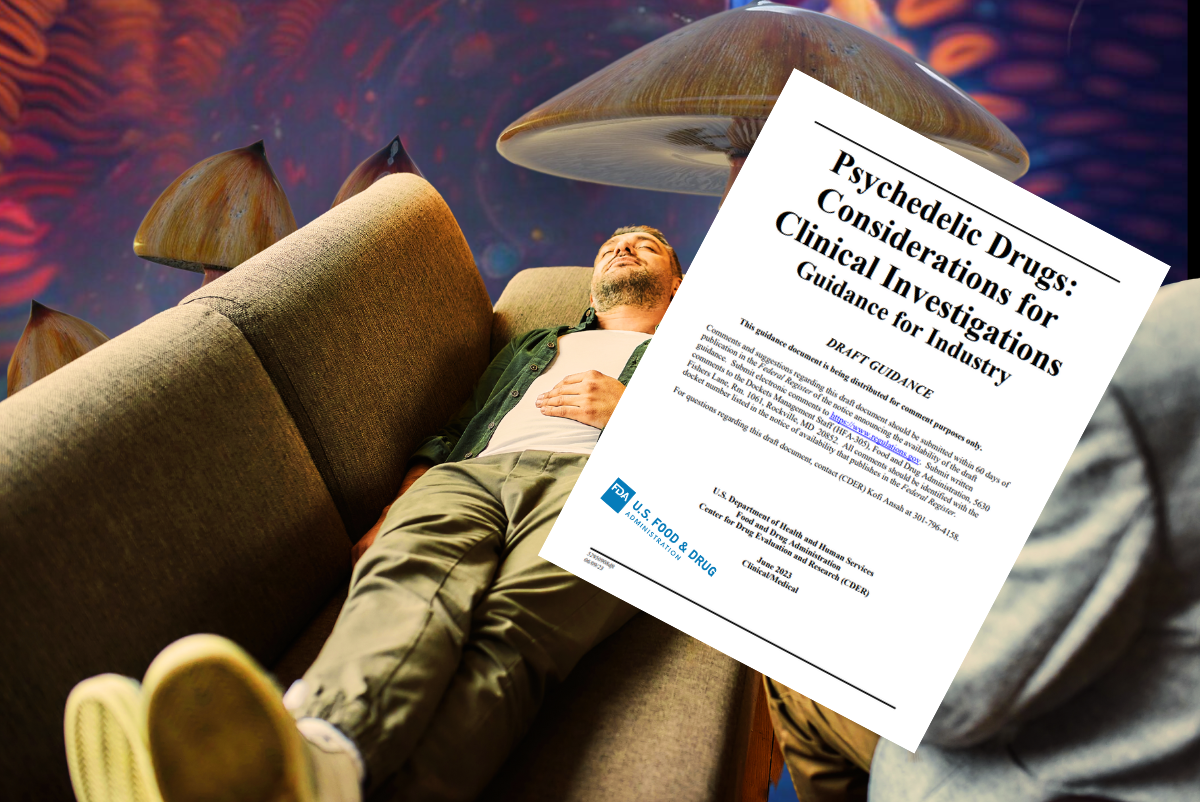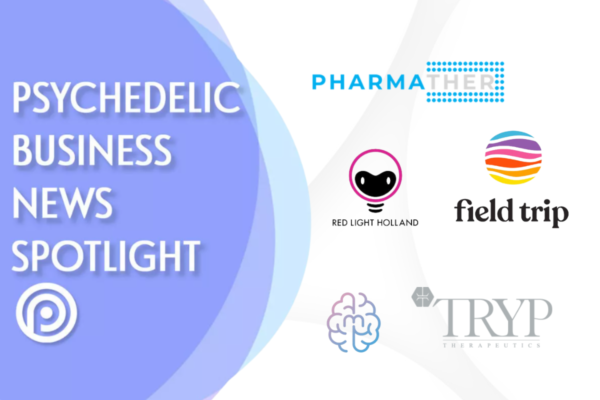
In the last three years, there were at least a hundred conferences in the United States focusing on the latest advancements in psychedelic research and medicine. While most of the psychedelic substances discussed at these events are currently classified as Schedule 1 drugs by the U.S. Drug Enforcement Administration (FDA), meaning that, outside of clinical research, they are illegal, it sure seems like this may soon change. 2023 has proven to be a pivotal year in pushing psychedelic medicines towards legalization with psychedelic clinical studies nearing Phase 3 trials, which is the last step before FDA approval.
On June 23rd of this year, the FDA published a new draft guidance intended to advise researchers on psychedelic study design when investigating the potential of psychedelics for treating psychiatric conditions.
While some of the outlined principles are reasonable and necessary to support the ethical conduct, integrity and reliability of psychedelic clinical studies, some recommendations have sparked a debate amongst researchers.
In this guidance, the FDA expresses concerns with the psychological support component of psychedelic therapy and encourages sponsors to justify its presence during and after administering the drug. It also urges them to describe any trial design elements intended to reduce potential bias or “to quantify the contribution of psychotherapy to the overall treatment effect.” These reservations are built upon their belief that psychotherapy or psychological support complicate the assessment of efficacy and labeling of the psychedelic treatment/compound. The FDA also recommends that there should be alternate trained professionals providing psychological support during and post-treatment since the monitors can easily identify the participants who have received the psychedelic treatment and those who have been administered a placebo.
Some critics are concerned that the guidance does not clearly understand the role of psychological support in psychedelic treatments, something that many academics in the psychedelics space consider to be a key variable to treatment sustained success. Numerous psychedelic facilitators and practitioners tend to agree that building rapport and trust with the patient is a key factor in optimizing treatment outcomes. So wouldn’t changing the aftercare staff disturb the efficacy of the treatment process, or at least slow it down? And wouldn’t limiting psychological support reduce patient response? After all, the goal of psychedelic-assisted therapy is to provide a necessary and efficacious solution to people diagnosed with mental health conditions.
Tea Petkova, an IFS trained Psychedelic Facilitator who holds a Master’s Degree in Applied Cognitive Neuroscience and works at Mycelia Psilocybin Retreats as a psychedelic practitioner has some concerns about the impact of reduced psychological support.
“Coming from a research background, I understand the need to control for psychotherapy as a mediating variable while investigating the effectiveness of psilocybin on various aspects of mental well-being,” she told Psychedelic Spotlight. “However, from the perspective of a practitioner, I strongly believe that going through preparation, expansion, and integration with the same facilitator builds a level of trust that potentiates and supports the behavioral malleability which psilocybin initiates,” she continued. “Ethically speaking, if there is a need for more information on the specificity of effects that psilocybin has in isolation, this research needs to be conducted in healthy subjects who are not experiencing any mental health diagnoses at the moment of treatment.”
The problem with that is that most of the current psychedelic clinical trials investigating the effectiveness of psychedelics in treating a variety of psychiatric disorders recruit volunteers who are diagnosed with mental health problems such as treatment-resistant depression, anxiety disorder, and other debilitating illnesses. These trials often provide some form of psychological support during and post-administration of the psychedelic drug due to the cathartic nature of the psychedelic experiences. While psychedelics’ capacity to induce altered states of consciousness can lead to psychological and emotional breakthroughs, without proper therapy support, and an optimized set and setting, there is a higher probability of facing challenging experiences which could lead to adverse effects, such as suicidal ideation, anxiety, fear, anger, low mood or depression, paranoia, panic attacks, shame or guilt, or resurfaced trauma. This is why most literature in the psychedelic space puts an emphasis on the necessity of having a trusted friend, a trip sitter, a psychedelic facilitator or a trained psychotherapist to be present during the trip. Integration support becomes an essential element post-journey by helping individuals navigate the sometimes unpredictable and overwhelming nature of the psychedelic experience. In both phases, the presence of trust between the monitor or therapist and the patient provides a sense of safety and comfort to the individual who will be put in a state of vulnerability that comes with experiencing altered states of consciousness induced by the medicine. Following this logic, limiting psychological support or altering the aftercare personnel may limit the long-term benefits of these substances.
As Tea points out, “these medicines are not magic bullets, the healing and healthy integration of insight is a relational and dynamic process that arises from co-regulation and healthy mirroring.”
“In my experience, many of the individuals undergoing psychedelic therapy are doing so because of persistent and severe mental health struggles,” Tea noted. “For a client coming from a home riddled with instability and maladaptive coping mechanisms, the container of a safe and nurturing therapeutic relationship prior to engaging in the treatment can be crucial to allowing the trust to deepen enough so that when the vulnerability of expanded awareness is explored, the client isn’t left feeling unsafe, overwhelmed and working through traumatic experiences with a practitioner with whom they only have a superficial connection,” Petkova continued.
“Oftentimes, the therapist or practitioner is the first role model of ‘healthy’ relating the client has had in their life. From an Internal Family Systems perspective, each individual has layers of protective parts that need to first trust the therapist in order to allow access to the really vulnerable, hurt parts that need healing. The capacity for a client to continue processing their holotropic experience within that same container of safety that was developed before the journey and during the integration period makes intuitive sense to me, and is the method I work with in my own clients to ensure the full therapeutic potential of the psychedelic treatment,” she stated.
The entire concept of psychedelic-assisted therapy revolves around the idea that therapy is an essential part of the mix. Most studies point to psychedelics’ capacity to create neuroplasticity and break down neural pathways responsible for the maladaptive behavior of the patient. Psychedelic support during the treatment, ensures patient safety and provides comfort while they are in a vulnerable state, while integration therapy helps to reinforce the newly created neural connections, and diminishes the maladaptive behavior.
What would happen if we take the therapy variable out of the equation? Some proponents believe that this would remove certain barriers to access. So let’s play the devil’s advocate for a moment.
Let’s say clinical trials were capable of providing enough evidence that psychedelic therapy with limited psychological support could be effective, and integration therapy was presented as an option post-treatment. How would that help the patient?
The argument comes down to the reduced treatment costs. The limited psychological support approach would help in reducing a key element that presents a barrier to access to these types of therapies. The entire psilocybin therapy treatment process can last between 18 to 25 hours in total, with psychotherapists typically charging $150 to $200 per hour. This piles up a hefty sum for a compound that grows naturally in nature. Furthermore, if or when MDMA-assisted therapy gets FDA approval, treatment rounds could cost between $13,000 and $15,000, mostly due to the 42 hours of psychological support required, which should be provided by teams of two. Taking off one variable that contributes to the financial constraints that patients will face when seeking psychedelic therapy sounds reasonable, but should that be psychological support?
If the goal is to optimize the treatment sessions for patients and improve mental health outcomes, shouldn’t we focus on optimizing the psychedelics used and allowing health insurance coverage for these treatments?
Optimizing the psychedelic molecule is the approach taken by psychedelic biotech companies, such as Cybin and Compass Pathways, who have focused their efforts in synthesizing next-generation psychedelics designed to provide the same therapeutic effects with a significantly reduced onset time. The appeal of these next-gen treatments is their potential to reduce the direct costs of delivering the therapy. However, even these biotech companies acknowledge the need for psychological support in their clinical trials. Compass Pathways even attempted to patent some of the basics of psilocybin-assisted therapy, including simple actions from therapists, such as, “the therapist provides reassuring physical contact,” “the therapist responds to the subject if the subject initiates conversation,” and “the therapist holds the hand, arm, or shoulder.”

Clearly, startups, academics and researchers are aware of the necessity of psychological support in the current psychedelic-assisted therapy model. So what is the motivation behind the FDA’s recommendation? It all points to profitability.
“Psychedelic substances are being used to treat psychological illnesses and psychological illnesses require psychological support, prompting questions about the FDA’s – and Big Pharma’s – motivations,” says John Gilchrist of TheraPsil, a Canadian non-profit organization advocating for access to psilocybin-assisted therapy for individuals suffering from end-of-life distress.
“The lack of understanding, coupled with pharmaceutical lobbying, favors the biomedical model for profitability,” Girlchrist notes. “However, removing therapy is shortsighted, limiting the effectiveness of treatment. With so many other issues at hand, such as safety, dosing and the number of treatments, why is the vital role of psychological support in psychedelic clinical trials being brought into question?” According to John, this debate reflects a “broader issue of prioritizing profit over comprehensive care.”
The bottom line is that the medical system needs to focus on optimizing treatments for long-lasting results while aiming to minimize costs.
Instead of recommending limited psychological support in clinical trials, the focus should be on investigating the mechanisms underlying the persisting changes post-psychedelic therapy, the psychedelic’s unique profile of pharmacological effects, and how these substances can be utilized optimally for long-lasting results while preventing unnecessary risks. Not all psychedelics have the same mechanism of action, and not all individuals have the same sensitivity to psychedelics. While there are a plethora of anecdotal cases and longitudinal studies of individuals reporting reduced symptoms of depression, anxiety, and PTSD without the need of extended psychological support, a recurrent theme is that psychedelics like psilocybin, while more effective than conventional treatments, have a time-limited window of antidepressant effects, suggesting that a single dose isn’t a magical cure. If repeated doses are necessary in some cases, a dosing regime in conjunction with therapy in a legal setting will prove to be quite expensive without health insurance coverage. This means that a majority of the population not responding to current medications will be unable to get access to these medicines.
It’s safe to say that embracing the FDA approach to legalizing psychedelic-assisted therapy introduces rigorous regulatory requirements and clinical research necessary for approval. While this is important to prove safety and efficacy, it is a time-consuming and resource-intensive process that delays access to these medicines. Although FDA-approved treatments have the potential to loosen up regulations and make psychedelic medicines more accessible, costs will ultimately be influenced by the pharmaceutical industry’s profit-centric model – at least until companies synthesizing these substances or growing natural psychedelics reach economies of scale, and until employers begin offering psychedelic-assisted therapy as part of their employment benefits.





